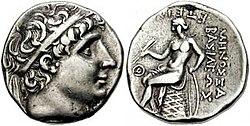
Back Basileus ALS باسيليوس Arabic Basilevs Azerbaijani Басилевс Bashkir Василевс Bulgarian Basileu Catalan Basileus Czech Basileus German Βασιλεύς Greek Basileos Spanish
 Coin of Antiochus I Soter. The reverse shows Apollo seated on an omphalos. Inscription reads ΒΑΣΙΛΕΩΣ ΑΝΤΙΟΧΟΥ (lit. 'of king Antiochus'). | |
| Romanization | basileus |
|---|---|
| Pronunciation | Ancient Greek: [basile͜ús], Modern Greek: [vasiˈlefs] |
| Gender | male |
| Language(s) | Greek |
| Origin | |
| Meaning | King, Emperor, Monarch |
| Region of origin | Ancient Greece |
Basileus (Ancient Greek: βασιλεύς)[a] is a Greek term and title that has signified various types of monarchs in history. In the English-speaking world it is perhaps most widely understood to mean 'monarch', referring to either a 'king' or an 'emperor'. A similar name deriving from Basileus was also used by bishops of the Eastern Orthodox Church and Eastern Catholic Churches.[1] The title was used by sovereigns and other persons of authority in ancient Greece (especially during the Hellenistic period), the Byzantine emperors, and the kings of modern Greece.
The feminine form is usually Basilissa (βασίλισσα), but also Basillis (βασιλίς) or the archaic Basilinna (βασιλίννα), meaning 'queen' or 'empress'.[2][3]
Cite error: There are <ref group=lower-alpha> tags or {{efn}} templates on this page, but the references will not show without a {{reflist|group=lower-alpha}} template or {{notelist}} template (see the help page).
- ^ "www.synaxaristis - ΜΕΓΑΣ ΣΥΝΑΞΑΡΙΣΤΗΣ". www.synaxarion.gr. Retrieved 2024-06-27.
- ^ Brown, Roland Wilbur (1956). Composition of Scientific Words: A Manual of Methods and a Lexicon of Materials for the Practice of Logotechnics. Smithsonian Institution Press. ISBN 9780874742862.
- ^ "The COININDIA Coin Galleries: Indo-Greeks: Agathocleia (Agathokleia)". coinindia.com. Retrieved 2024-06-27.